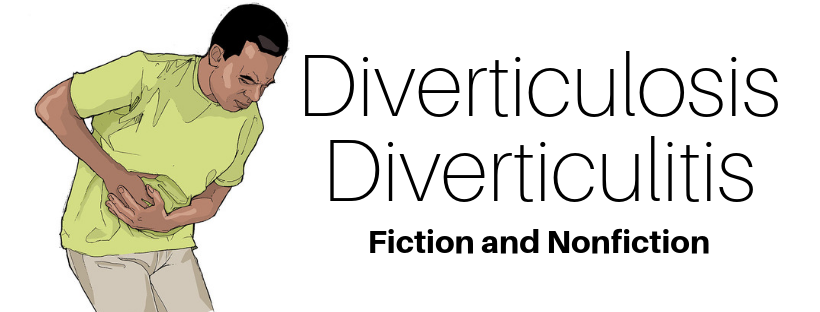Diverticulosis/diverticulitis: Fiction and Nonfiction
I have been working in GI for a long time now and find that over the years there has been quite a lot of confusion when it comes to diverticulosis and diverticulitis. Most people think that every time you have pain in the abdomen it is “diverticulitis” flaring up. They do their best to avoid seeds and nuts and have avoided popcorn at the movies for years! There are dietary misconceptions that have been perpetuated by the medical community as a whole for many years and even today. This short posting will hopefully help to define these conditions, how they develop and how to treat them when they occur and will address the question of dietary restrictions.
First of all, a few definitions:
Diverticulum—a sac-like protrusion or outpouching in the colon wall
Diverticulosis—the presence of diverticula
Diverticulitis—inflammation of a diverticulum, acute or chronic, uncomplicated or complicated (abscess, fistula, obstruction or perforation)
Diverticular disease—clinically significant and symptomatic diverticulosis due to diverticular bleeding, diverticulitis, colitis associated with diverticula.
Diverticular bleeding—painless bright red blood from the colon due to a weak blood vessel in a diverticulum.
Diverticulosis becomes more common as we age, less than 20% when we are under 40 and up to 60% at age 60. Most diverticula are found near the end of the colon in the section called the sigmoid. Diverticular bleeding occurs in about 5-15% of people and can be a very large amount leading to hospitalization. The majority of bleeding comes from the right colon diverticula. Approximately 4-15% of people with diverticulosis develop diverticulitis and this also increases with age. Cases of diverticulitis are becoming more common in the last 20 years and the risk is about the same for males and females.
Risk Factors:
- High dietary intake of red meat
- Low dietary fiber intake
- Lack of vigorous physical activity
- High body mass index (BMI > 25)
- Smoking (greater than 40 pack year history)
What about seeds and nuts? (The question that everyone asks!)
Nut, corn, and popcorn ingestion are NOT associated with an increase in the risk of diverticulosis, diverticulitis or diverticular bleeding. This was proven in a very large observational study of nearly 50,000 men between the age of 40 and 75.
Also, a few medications put folks at greater risk including:
- NSAID’s (Advil, Aleve, ibuprofen, Motrin, naproxen, etc.)
- Steroids (prednisone)
- Opiates (Percocet, hydrocodone, etc.).
High vitamin D levels reduced the risk of complicated diverticulitis requiring hospitalization.
Now to answer a few quick questions:
How do diverticula develop?
It is hypothesized that they occur at a specific point of weakness in the colon wall. Those with stronger or exaggerated contractions of the colon wall at these points of weakness have more of a tendency to develop these pockets.
 What is the cause of diverticulitis?
What is the cause of diverticulitis?
It is caused by very small perforations in the pocket (diverticulum) thought in the past to be caused by obstruction of one of these pockets by the stool. It is now thought that obstruction from stool is actually rare and that the primary reason is the erosion of the diverticular walls by an increase in pressure in the colon or by food particles that have passed to the colon and become dried out leading to the inflammation and small perforations. Also and unfortunately, the risk of another episode of diverticulitis goes up after the first episode.
What about the pains that come and go in people with diverticulosis? Is it a flare of diverticulitis?
As we have noted above, many people have pockets in the colon and many of them have intermittent pain, often in the lower abdomen. It is not typically related to infection/inflammation of a pocket (diverticulitis) but more likely related to a hypersensitivity to colon contractions. Actual diverticulitis leads to persistent and constant pain that will build over time often to the point of needing professional attention with the primary care provider or gastroenterology specialist. I have found that quite often patients with episodes of diverticulitis can tell the difference between a flare and simple spasm type pain of the colon but it can be hard to tell the difference and so I recommend that if you have pain that seems harder or more prolonged than normal, seek advice from the professionals!
In summary, if you have been diagnosed with diverticulosis (and many of us have!) then do what you can to help avoid complications by eating a good high fiber diet, keeping your weight down, exercising, drinking plenty of water (6-8 cups daily), quitting smoking (I know it is easier said than done but worth the effort in many ways!) and keeping your bowels moving well with good, complete evacuation. As far as the seeds and nuts, as we have established, there is no known link but as a wise and very experienced GI MD once told me, use common sense and eat these things in moderation and if you think nuts/seeds have led to an episode of diverticulitis then no one can fault you for avoiding those in the future!
If you have questions about any of this, discuss it with your GI professional who will be glad to answer and clarify.
This information is a brief summary of a reliable professional medical web site with some personal experience thrown in!
Article by Gregory Barton, PA-C. Learn more about him here: https://digestivehealth.ws/provider/gregory-a-barton/
—
Digestive Health Specialists, PA is here to help if you, or someone you know, would like more information, or if you are experiencing any of the above symptoms and would like further evaluation. To make an appointment, feel free to give us a call at 336-768-6211.







